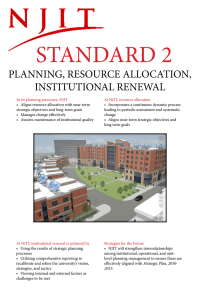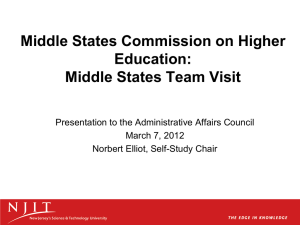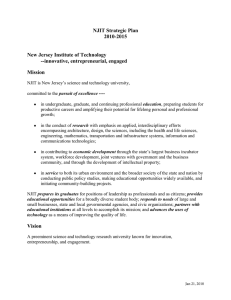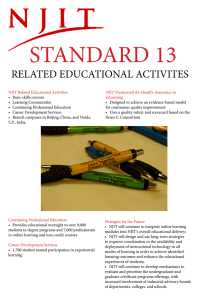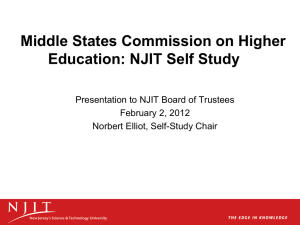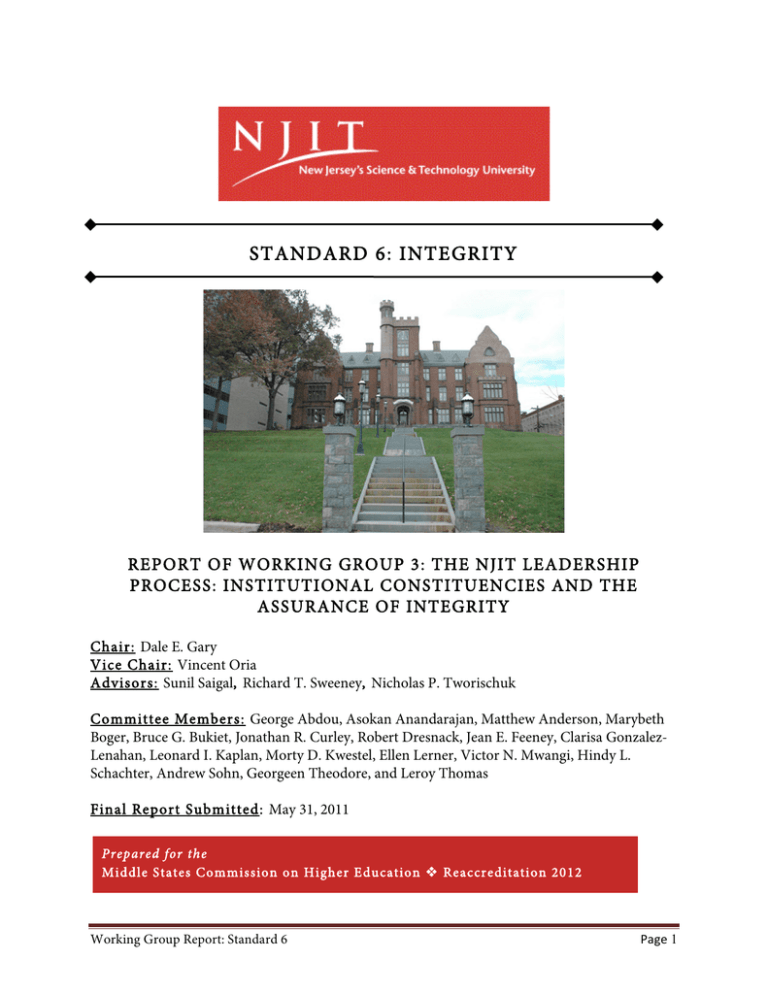
STANDARD 6: INTEGRITY
REPORT OF WORKING GROUP 3: THE NJIT LEADERSHIP
PROCESS: INSTITUTIONAL CONSTITUENCIES AND THE
ASSURANCE OF INTEGRITY
Chair: Dale E. Gary
Vice Chair: Vincent Oria
Advisors: Sunil Saigal, Richard T. Sweeney, Nicholas P. Tworischuk
Committee Members: George Abdou, Asokan Anandarajan, Matthew Anderson, Marybeth
Boger, Bruce G. Bukiet, Jonathan R. Curley, Robert Dresnack, Jean E. Feeney, Clarisa GonzalezLenahan, Leonard I. Kaplan, Morty D. Kwestel, Ellen Lerner, Victor N. Mwangi, Hindy L.
Schachter, Andrew Sohn, Georgeen Theodore, and Leroy Thomas
Final Report Submitted: May 31, 2011
Prepared for the
M iddle States Com mission on Higher Education Reaccreditation 2012
s
Working
Group Report: Standard 6 Page 1 TABLE OF CONTENTS
6.0 W ORKING GROUP ASSESSM ENT CHECKLIST FOR STANDARD 6
3 6.1 INTRODUCTION
5 6.11 Précis
6.12 The NJIT Model of Integrity
5 5 6.2 ANALYTICAL DISCUSSION OF THE INQUIRY AND OUTCOM ES
6 6.2.1 NJIT Core Values: Excellence, Integrity, Student-Centeredness, Civility, and Diversity
6.2.2 Sustaining the NJIT Model of Integrity
6.2.3 Role of the Ethics Liaison Officer
6.2.4 Fostering, Assessing, and Sustaining the Core Values
6.2.5 Fostering Diversity
6.2.6 Integrity and the Faculty Review Process; Updated Faculty Handbook Revisions Complete
6.2.7 Integrity and Campus Culture
6.2.8 Integrity and the Student
6 7 7 8 9 10 11 11 6.3 CRITICAL ANALYSIS
12 6.3 COLLABORATON W ITH OTHER W ORKING GROUPS
12 6.4 RECOM M ENDATIONS
12 6.4.1 Recommendations Table: Standard 6: Integrity
13 Working Group Report: Standard 6 Page 2 6.0 WORKING GROUP ASSESSMENT CHECKLIST FOR STANDARD 6
FUNDAMENTAL ELEMENTS OF
INTEGRITY
(Characteristics of Excellence in Higher Education:
Requirements of Affiliation and Standards of
Accreditation. Philadelphia, PA: MSCHE, 2009)
fair and impartial processes, published and widely
available, to address student grievances, such as alleged
violations of institutional policies. The institution
assures that student grievances are addressed promptly,
appropriately, and equitably;
TEAM EVALUATION
4=EXEMPLARY
3=EMERGING EXCELLENCE
2=MEETS STANDARD
1=DEVELOPING COMPETENCY
3
fair and impartial practices in the hiring, evaluation and
dismissal of employees;
3
sound ethical practices and respect for individuals
through its teaching, scholarship/research, service, and
administrative practice, including the avoidance of
conflict of interest or the appearance of such conflict in
all its activities and among all its constituents;
equitable and appropriately consistent treatment of
constituencies, as evident in such areas as the application
of academic requirements and policies, student
discipline, student evaluation, grievance procedures,
faculty promotion, tenure, retention and compensation,
administrative review, curricular improvement, and
institutional governance and management;
a climate of academic inquiry and engagement supported
by widely disseminated policies regarding academic and
intellectual freedom;
an institutional commitment to principles of protecting
intellectual property rights;
a climate that fosters respect among students, faculty,
staff, and administration for a range of backgrounds,
ideas, and perspectives;
Working Group Report: Standard 6 3
3
4
3
3
Page 3
honesty and truthfulness in public relations
announcements, advertisements, and recruiting and
admissions materials and practices;
3
required and elective courses that are sufficiently available
to allow students to graduate within the published
program length;
2
reasonable, continuing student access to paper or
electronic catalogs;
3
when catalogs are available only electronically, the
institution’s web page provides a guide or index to
catalog information for each catalog available
electronically;
when catalogs are available only electronically, the
institution archives copies of the catalogs as sections or
policies are updated;
changes and issues affecting institutional mission, goals,
sites, programs, operations, and other material changes
are disclosed accurately and in a timely manner to the
institution’s community, to the Middle States
Commission on Higher Education, and to any other
appropriate regulatory bodies;
availability of factual information about the institution,
such as the Middle States Commission on Higher
Education annual data reporting, the self-study or
periodic review report, the team report, and the
Commission’s action, accurately reported and made
publicly available to the institution’s community;
information on institution-wide assessments available to
prospective students, including graduation, retention,
certification and licensing pass rates, and other
outcomes as appropriate to the programs offered;
institutional information provided in a manner that
ensures student and public access, such as print,
electronic, or video presentation;
3
3
2
2
2
3
fulfillment of all applicable standards and reporting and
other requirements of the Commission; and
2
Working Group Report: Standard 6 Page 4
periodic assessment of the integrity evidenced in
institutional policies, processes, practices, and the
manner in which these are implemented.
3
6.1 INTRODUCTION
6.11 Précis
Integrity at NJIT permeates at two levels. At a macro-level, integrity is included as a core value in
the NJIT strategic plan, the university has embraced the state-mandated Uniform Code of Ethics
for faculty, administration and staff, and student integrity is guided by the University Code of
Academic Integrity. At the micro-level NJIT fosters, assesses and maintains integrity through
ethics training, conflict of interest disclosure, and online sexual harassment training, and by
providing events highlighting women’s issues, cultural diversity, and sexual orientation. NJIT’s
policies and procedures ensure integrity in faculty selection, promotion, tenure, retention and
compensation and administrative review. The integrity in the process of promotion and tenure is
reflected in published and widely available criteria and policy statements in the Faculty
Handbook and in documents on the Provost web page. NJIT’s University Code of Academic
Integrity meets the standard of other technology schools we have examined, with clear and easily
understood language and clearly articulated and enforced penalties for violations.
6.12 The NJIT Model of Integrity
To examine NJIT’s policies and practices in the area of integrity—defined assurance to our
shareholders that NJIT is committed to high ethical standards and the pursuit of intellectual
freedom—the Steering Committee and Working Group 3 jointly developed the following charge
questions:
1. What strategies are used by NJIT to achieve and communicate its integrity as the state's
public science and technology university? (Sections 6.1 and 6.2.4)
2. Employing processes such as those determined by the Internal Review Board, how does
the university maintain an effective framework for ethical conduct in the areas of
education, research, economic development, and service? (Section 6.2.2)
3. What evidence is there that NJIT fosters, assesses, and maintains the integrity of faculty,
instructional staff, and administrators? (Section 6.2.3)
4. What strategies are used at NJIT to foster a climate that demonstrates respect among
students, faculty, staff, and administration for a range of backgrounds, ideas, and
perspectives? (Section 6.2.5)
5. What mechanisms are used by NJIT to meet the standards set by the New Jersey State
Conflict of Interest statutory mandates, as well as ensure that the NJIT community is
aware of, and complies with, New Jersey State ethics laws, regulations, and executive
orders? (Section 6.2.5)
6. How effectively does NJIT demonstrate integrity in faculty selection, promotion, tenure,
retention, compensation, and administrative review? (Section 6.2.5-6.2.6)
Working Group Report: Standard 6 Page 5 7. How effective are the strategies used by NJIT to instill integrity across its colleges,
athletics, and other endeavors so that students adhere to principles of academic integrity
while enrolled in our academic programs? (Section 6.2.7)
8. How do NJIT.’s integrity policies compare to science and technology universities
nationwide? (Section 6.2.8)
6.2 ANALYTICAL DISCUSSION OF THE INQUIRY AND OUTCOMES
The report Characteristics of Excellence in Higher Education (2009) provides a list of
fundamental elements of integrity that institutions should aspire to meeting. The key issues
relate to:
• Fair and impartial processes, published and widely available;
• Fair and impartial process in the practice of employee hiring;
• Adoption of sound ethical practices and avoidance of conflict of interest;
• Clear guidelines available to all for faculty promotion and tenure;
• Ensuring climate that fosters respect among students, faculty, staff;
We critically examined our institution based on these and other guidelines commencing in
section 6.2.1.
6.2.1 NJIT Core Values: Excellence, Integrity, Student-Centeredness, Civility, and Diversity
There are many strategies and practices that NJIT uses to achieve and communicate its integrity
as the state’s public science and technology university, which include, but are not limited to, the
following highlights: the inclusion of integrity as a core value within the NJIT strategic plan
(Altenkirch, 2010); the president and academic leaders’ various communications to the
community (Altenkirch, 2004); NJIT requiring disclosure forms and compliance with the
“Uniform Code of Ethics” from the NJ State Ethics Commission; reminders and training from
our NJIT Ethics Liaison Officer; the revision of “The University Code on Academic Integrity”
regarding student integrity polices developed in 2008-09 by the Dean of Students with input
from students and approved by the university; ethical regulations prominently posted on the
NJIT website; new faculty orientations; periodic ethical training by the NJIT Human Resources
department such as how to understand and avoiding sexual harassment: codes of conduct for use
of the libraries and computers; and, within individual departments, videos dealing with avoiding
plagiarism . Such communications and feedback serve as a constant reminder to the NJIT
community.
In 2006, NSF awarded NJIT a three-year ADVANCE grant aimed at advancing women faculty by
facilitating collaborative research networks (ADVANCE, 2011). The intent is to avoid the
possibility of women faculty being isolated in the workplace, and thus improving their potential
for developing leadership roles at the Institute. Integration of studies conducted by the
ADVANCE team will foster a climate of diversity at NJIT.
Working Group Report: Standard 6 Page 6 6.2.2 Sustaining the NJIT Model of Integrity
NJIT maintains and promotes ethical conduct throughout the university, most visibly through
the efforts of the Institutional Review Board (IRB), the Sponsored Research office, the Office of
Human Resources, and the Dean of Students office, but also through, among others, the ethical
policies involving computing resources and intellectual property. The NJIT Institutional Review
Board (IRB) works to assure that researchers fulfill the public’s trust in the research enterprise by
putting the welfare of research participants ahead of the interests of the institution or of the
researcher’s personal financial interests (Apgar, 2007; IRB, 2007). Any conflicts of interest with
the rights or welfare of research participants must be disclosed to the IRB, which determines
whether a conflict exists and manages any conflicts in accordance with the best interests of
research subjects. Among the issues dealt with by the IRB are the following: respect for persons;
consent, privacy, and confidentiality; beneficence; risks versus benefits; justice; and equity.
Human subjects’ protection training is required for all members of research teams (SRA, 2011).
The Sponsored Research Administration ensures that funds provided from external sources to
support research and other projects are administered in accordance with university policies as
well as those of the sponsor (OHRP, 2011). The Department of Human Resources plays an
important role in training and maintenance of ethical conduct, including through its Ethics
Liaison Office (Human Resources, Ethics at NJIT, 2011). The orientation for new employees
deals with (among other issues) ethics with respect to the NJIT community, training,
prohibitions, the scholarly capacity rule, disclosures, post-employment and reporting issues
(Human Resources, New Employees, 2011). The NJIT Dean of Students strives to promote and
maintain academic integrity and integrity of student behavior and academic processes, including
implementing appropriate sanctions for violations thereof (NJIT, University Code, 2009).
Academic and professional integrity extends to the use of computing resources as well as with
respect to the related issue of plagiarism (CAA, 2006). Promotion of ethical conduct also extends
to the intellectual property arena through a contract that university-employed inventors must
sign (Research and Development, 2009).
As further evidence of integrity at NJIT, in October of 2007 the State Commission on
Investigation released an extensive report examining the governance, oversight, and
accountability of post-secondary institutions in the state. The investigation was extensive, and
billions of dollars of transactions were reviewed. In the report—Vulnerable to Abuse: The
Importance of Restoring Accountability, Transparency, and Oversight to Public Higher
Education Governance—NJIT emerged as an institution with a capable administrative structure
in place, one that maintained effective, efficient, and ethical operating practices. While the
Commission noted that additional state oversight would be beneficial across post-secondary
institutions, NJIT was fared well—indeed, arguably emerging as a leader in sound fiscal
management—in the report (SCI, 2007).
6.2.3 Role of the Ethics Liaison Officer
The May 2008 creation of the position of Ethics Liaison Officer was spurred by new State
regulations. Mechanisms were put into place to ensure that NJIT meets the standards as outlined
Working Group Report: Standard 6 Page 7 by the Conflict of Interest Law (to ensure the NJIT community is aware and in compliance with
the law, regulations, and executive orders).
Ethics training is required of all employees, who are clearly informed that the New Jersey State
Act 52.34-10.9 requires that officers and employees of NJIT, who are involved in the
procurement process, file disclosure statements (Human Resources, Disclosure, 2011) about
personal and business relationships. There are three types of disclosures that must be recorded
on this form; disclosure of any interest in a firm; any professional relationship with any party that
has been awarded a public contract with NJIT; any personal relationship with a firm that has
been awarded a public contract with NJIT. In addition, an “Attendance at Events” form (Human
Resouces, Attendance, 2011) is required of each employee prior to attending an event, to obtain
prior approval. The form specifies that the employee is not permitted to accept an honorarium or
fee for any activity he or she participated in at the event. Yearly disclosure (Human Resources,
Published Works, 2011) is required of faculty (employees serving at NJIT in a scholarly capacity)
of all benefits received for engaging in scholarly activity from all sources except benefits received
from NJIT. Outside activities, too, whether compensated or voluntary, must be disclosed by
completing the State of New Jersey Outside Activity Questionnaire and receiving permission
from the supervisor and the NJIT Ethics Liaison Officer.
The President of NJIT completes a mandatory Financial Disclosure Statement, and the members
of the Board of Trustees must complete an annual Conflicts of Interest Disclosure Form. Finally,
NJIT regularly provides information to employees on an ongoing basis updating them on issues
involving ethics. These are published on the NJIT Ethics Website and the Human Resources
website. State-published newsletters are sent to the NJIT community, and posted on the NJIT
Ethics and Human Resources websites. The Human Resources website further publishes
newsletters relevant to ethics and conducts an awareness campaign to notify the NJIT
community of their rights and responsibilities under the law, regulations, and executive orders.
Other methods involve maintaining a constant state of awareness of ethical rights and
responsibilities; a mechanism to report ethical violations that employees may become aware of
and a recusal process for employees when an event occurs that could cause them a personal or
financial conflict of interest. NJIT has an ethics reporting mechanism for members of the NJIT
community to report suspected ethics violations, and a recusal process for NJIT
employees/officers to recuse themselves when there is a personal or financial interest that would
conflict with their responsibilities.
6.2.4 Fostering, Assessing, and Sustaining the Core Values
The mechanisms NJIT employs to foster ethical conduct of faculty and staff commences from the
first day of hire during the new hire orientation program (Johnson, 2010). The faculty and staff
are informed at orientation of relevant regulations that could affect them and codes of conduct
and professional behavior expected of them. It is required that faculty and staff attend the new
hire orientation program and participate.
Employee ethics training occurs at four different levels specific to faculty, adjuncts, staff, and
board members (Human Resouces, Ethics Regulations, 2011). Employee activities are constantly
Working Group Report: Standard 6 Page 8 monitored by requiring that they complete the activity forms described in section 6.2.3 before
entering into activities that could bear on ethics infringements. Employees are clearly informed
about the requirements to file disclosure statements about personal and business relationships.
In addition to flagging suspect activities, a goal of these requirements is to educate employees
about what constitutes an ethical violation and maintain awareness of ethical concerns. To this
end, certain information is disseminated yearly, such as the Conscientious Employee Protection
Act (CEPA), the State Uniform Ethics Code, and the New Jersey Supplemental Ethics Code. For
the latter two, a mechanism has been created that requires a receipt acknowledging the
employee’s understanding and acceptance of these codes.
In collaboration with the Office of Legal and Employment Affairs, and in keeping with NJIT’s
responsibilities under the law, HR conducted a mandatory managerial Sexual Harassment
Awareness training program in 2005 (Human Resources, HR Buzz, 2005), and encourages faculty
and staff to complete online sexual harassment training. Sexual harassment topics are part of the
new-hire training also (Johnson, 2010).
6.2.5 Fostering Diversity
The essence of diversity always been at the heart of NJIT but over the past several years diversity
has been developed and maintained in new ways. In 2005, President Altenkirch brought in a new
internet based sexual harassment seminar for the faculty (Altenkirch, 2005) and highlighted the
online sexual harassment policy that is accessible via the NJIT website (Human Resources, Sexual
Harassment, 2004). The University has always had a zero tolerance for sexual harassment but
awareness is equally important. For the years 2007 through 2009, only 1 hate crime and no sexual
assaults occurred on campus (Sabattis, 2010).
More importantly NJIT actively engages its diverse population of students with an array of social
events targeting women, different cultures, and diverse sexual orientations. Integral to this
investment is the ADVANCE initiative discussed above. As well, the NJIT Campus Center has a
Diversity Programs Office that coordinates and funds programs with student clubs such as
Spectrum, HOST/SHPE, NSBE and AIS (Student Leadership Programs, 2011) (Student Senate,
2011). In addition, the Campus Center’s Women’s Center, home to the Committee on Women’s
Issues, also coordinates with on-campus women’s groups, such as the Society of Women
Engineers, to ensure a balance in campus programming (Murray , 2011). In 2009, 82% of the
graduating class of 2013 rated the importance of cultural and life choice diversity from
moderately important to very important in their choice to come to NJIT (IRP, Entering
Undergraduate, 2009). As further proof of NJIT’s expanded programming, student satisfaction
with a feeling of community and the availability of cultural events, has improved from 58%
satisfaction in 2006 to a 67.3% satisfaction in 2010—an increase of 9.3% (IRP, Student
Satisfaction, 2009). Students on campus also feel as though they are being dealt with fairly by
administration and faculty. This rating has also increased 3%, from 69% to 72.2%.
To ensure NJIT’s diversity for years to come, the strategic plan for 2010-2015 (Altenkirch, 2010)
focuses on four fundamental values—three of which relate to diversity. “Integrity”, “Civility”,
and “Diversity”, three of the four values that NJIT will be enhancing over the next 5 years all
Working Group Report: Standard 6 Page 9 foster respect, integrity and the diverse demographics at NJIT. The school has also had an
initiative in place since 2005 to “Enhance the diversity of the faculty to mirror the percentage of
African-American, Hispanic, and women terminal degree recipients working in academia by
2010”(Steffen-Fluhr and Daniel, 2005). This initiative will be continued under the strategic plan.
Significantly, NJIT remains committed to attracting and enrolling the best and the brightest from
all backgrounds to ensure a rich diverse experience for students and faculty.
6.2.6 Integrity and the Faculty Review Process; Updated Faculty Handbook Revisions Complete
In keeping with the designation of integrity as a core value in the strategic plan, NJIT strives to
demonstrate integrity in all matters relating to faculty selection, retention, and advancement. Key
sections of the Faculty Handbook have now been updated (Faculty Council, Revisions, 2010) to
reflect better current practice and our commitment to an open process with high standards in
these areas. The updated Faculty Handbook provides guidelines (Faculty Council, Handbook,
2010) for the selection and appointment of faculty and key administrators (also described in the
earlier version of the Handbook (Faculty Council, Handbook, 2007)). The Equal Employment
Opportunity Policy is stated in the Handbook (Faculty Council, Handbook, 2007) and is also
included on all advertisements for open positions (Human Resources, Career Site, 2011).
Significantly, the Faculty Handbook has now been brought into compliance with the 2007 Middle
States review by Katherine Mayberry and Herman Berliner of our Periodic Review Report. That
is, Recommendation 1—that a “systematic revision of the Faculty Handbook, with particular
focus on ensuring that tenure and promotion policies are rigorous, clear, and consistent across all
colleges and departments”—has now been completed, as the records of the Faculty Council
demonstrate. As well, the role of the deans in the process of promotion and tenure has now been
clarified.
The integrity in the process of promotion and tenure is reflected in criteria and policy statements
in the updated Faculty Handbook (Faculty Council, Revisions, 2011) and in documents on the
Provost web page (Provost, Promotion, 2011) and distributed annually (Gatley, 2010) to
department chairs, to be disseminated to the faculty. The criteria for promotion and tenure can
vary among departments, and are specified by the department at the time of the promotion and
tenure request (Provost, Promotion Form, 2009), but the University Committee on Promotion
and Tenure is charged with applying the criteria consistently after rigorous review (Gatley,
Promotion Guidelines, 2010). Similar guidelines are followed for a rigorous third-year review
(Gatley, Third Year Review, 2010) of all tenure-track faculty, called for in the Faculty Handbook
(Faculty Council, Revisions, 2010) and conducted by the department, Dean, and Provost. Lack of
adequate progress demonstrated in the third-year review will result in a terminal year
appointment.
Like decisions on tenure and promotion, performance-based compensation is based on the four
main areas of teaching effectiveness, research, scholarship, and service (Faculty Council,
Revisions, 2010). During the period 2002-2009, the merit process was conducted by individual
departments based on internally defined criteria agreed to by the department P&T committee in
consultation with the Dean. In 2010-2011, and new, more centralized system, the Faculty
Working Group Report: Standard 6 Page 10 Performance Based Salary Increase Distribution System (Altenkirch and Golub, 2010), has been
instituted as part of contract negotiations between the administration and the PSA. This process
is more rigorous, adheres to strict criteria that are more uniform across all departments, schools
and colleges, and uses a uniform grading rubric according to set formulas. To ensure the integrity
of the process, the detailed reports and results are shared with faculty, who are allowed to make
corrections, and there is a period available for appeal. The final summary results will be openly
available. It is expected that this pilot program will become the model for future years.
6.2.7 Integrity and Campus Culture
A major reinterpretation of academic integrity policies on campus was led by students, for
students, working with the NJIT administration to create the honor code task force in 2008/2009
(NJIT, Academic Integrity, 2009), based on a previous investigation of integrity issues in 2006
(Task Force on Academic Integrity, 2006) This honor code task force developed a
comprehensive new University Code on Academic Integrity(hereafter, The Code), which was
adopted in 2009 (Sebastian, 2009)(NJIT, University Code, 2009). The Code creates clear and
effective consequences for code violations, through the creation of the XF grade that appears on
the student’s transcript with the notation “Failure due to academic dishonesty.” In addition to
specification of violations and consequences, the Code explicitly defines the responsibilities of
students, faculty, department chairs and advisors, and others involved in the process to create an
environment conducive to academic integrity. Responsibilities of the faculty include
communicating integrity policy and expectations, assisting in training of new faculty/instructors
in the policy, providing an environment that contributes to ethical behavior, and reporting
violations to the Dean of Students (Dean of Student, About, 2011). The Dean of Students
maintains anonymity to students who report violations, coordinates gathering of information,
and brings reports of violations to the Committee on Professional Conduct, which handles
integrity violations along with many other forms of professional conduct violation (Dean of
Students, Student Professional Conduct, 2011). The Code also creates an Honor Commission,
whose members are students, faculty and administrators, specifically for the purpose of creating
programs and publicity to promote academic integrity, assist in an annual seminar on academic
integrity, and to keep issues of academic integrity in the forefront of faculty and student
organizations.
In intercollegiate athletics, the NCAA places great emphasis on academic integrity as one of the
operating principles of the NCAA Certification Self-Study (NCAA Certification Steering
Committee, 2008). The organization of the NJIT Athletics department was built around
ensuring high academic standards for its student athletes.
6.2.8 Integrity and the Student
A comparative analysis of NJIT’s integrity policies to science and technology nationwide is a
crucial index of its achievement. Comparison is warranted among public institutions (e.g.,
Georgia Institute of Technology) private intuitions (e.g., Stevens Institute of Technology,
Rochester Institute of Technology). In comparison, it is evident that NJIT’s University Code on
Academic Integrity sets forth a clear, concise code of conduct, and easily understood and
Working Group Report: Standard 6 Page 11 enforced consequences, consistent with those of similar technology institutions. Moreover, its
existing policies compare very favorably with such similar institutions.
In furtherance of its commitment to integrity issues, NJIT might consult national organizations
such as Center for Academic Integrity (2011), which provides survey and assessment materials
for conducting an assessment of academic integrity on campus and Association for Student
Judicial Affairs/Association (2011), an organization for administrators engaged in adjudicating
integrity violations. A final component to further academic integrity at NJIT and help the
university sustain its high standards would be the adoption of a Virtual Academic Integrity Lab,1
an online resource for both students and educators to combat plagiarism and other academic
misconduct. It would also be very useful as a training exercise.
6.3 CRITICAL ANALYSIS
Based on the discussion above, it can be seen that NJIT meets or exceeds the criteria of the
Characteristics of Excellence in Higher Education report with respect to maintaining high
standards of integrity. In particular, NJIT has an on-going initiative—one that has now satisfied
the recommendations of the 2007 MSCHE review of the periodic review report—to notify the
NJIT community of their rights and responsibilities under the law. The Faculty Handbook
(section 2.4) provides clear guidelines on the practice of hiring employees, both administrators
and faculty. The institute avoids conflicts of interest by requiring employees to fill out personal
business disclosure forms (Human Resources, Ethics Regulations, 2011); attendance at events
forms (Human Resources, Attendance, 2011); and scholarly capacity disclosure forms (Human
Resources, Published Works, 2011). Transparency is provided with respect to faculty promotion
and tenure and guidance is provided in section 2.2.3 and 2.2.4 of the Faculty Handbook. Faculty
are provided with feedback about tenure in a third-year review available on the Provost web site
(Provost, Promotion, 2011). Further, Section 4 of the Faculty Handbook (subsection 4.1) states
that NJIT does not discriminate against any applicant regardless of age, gender and national
origin. Finally, NJIT has a clear home page from which individuals can steer to obtain any
information required regarding matters pertaining to maintaining standards of integrity.
6.3 COLLABORATON WITH OTHER WORKING GROUPS
In scheduled meetings hosted by the Rapid Assessment and Steering Committee, our Working
Group collaborated with other groups. Collaboration was also strengthened through meetings
with the self study consultant (Robert Clark). Asynchronous communication was fostered
through the open source content management system (Moodle); in that platform, the Working
Groups collaboratively reviewed each stage of the planning and reporting process, from question
design to outlines of the Working Group Reports, to edited review, to final copy.
1
The University of Maryland has implemented an online academic integrity which could serve as a helpful model for
NJIT.
Working Group Report: Standard 6 Page 12 6.4 RECOMMENDATIONS
While the NJIT Core Values address diversity of faculty and students who are already at NJIT, a
uniform plan should be implemented so that faculty and students from diverse backgrounds are
recruited, retained, and mentored to succeed (faculty achieving tenure and assuming leadership
positions, and students graduated in a timely fashion and started on rewarding careers).
We recommend a more consistent and thorough reporting by instructors of integrity violations
in the classroom, and mandatory periodic reminder to faculty members and follow-through by
the department chairperson of actions expected of faculty in the written policies set forth in the
University Code on Academic Integrity.
6.4.1 Recommendations Table: Standard 6: Integrity
RECOMMENDATION 1
Create and implement a uniform
plan to recruit, retain, and mentor
faculty and students from diverse
backgrounds.
•
VISION: The desired future for the
recommendation
Improve the gender and ethnic diversity of the
University.
•
STRATEGY: The methodology
recommended to achieve the vision
For faculty, create incentives for search
committees to select candidates from diverse
backgrounds, and for candidates to accept
offered positions. For students, increase
recruitment efforts, especially to women.
Continue to use analysis gained by ADVANCE
effort sponsored by NSF.
•
TACTIC: The specific action
recommended to implement the
strategy
Create a pool of funds to be used to create faculty
slots, and to entice well-qualified candidates from
diverse backgrounds to accept positions at NJIT.
Institute a recruitment committee to create
promotional materials and identify targeted
groups for outreach.
•
ASSESSMENT: The metric
recommended to measure
achievement of the vision
Improvements in diversity among faculty and
students.
RECOMMENDATION 2
Working Group Report: Standard 6 Achieve a better awareness on the
part of instructors on NJIT’s
University Code on Academic
Page 13 Integrity, and their roles in
reporting cheating in the
classroom
•
VISION: The desired future for the
recommendation
Each instructor will receive individual
instruction on the University Code on Academic
Integrity, their role in it, and will receive yearly
reminders of its importance.
•
STRATEGY: The methodology
recommended to achieve the vision
Oversight and verification of transmittal of
information flowing from Deans to department
chairs to individual instructors. Consultation
with Center for Academic Integrity and Student
Judicial Affairs/Association to define tactics and
assessment plans.
•
TACTIC: The specific action
recommended to implement the
strategy
Deans ensure individual training of department
chairs in required actions and responsibilities of
their instructors. Chairs ensure individual
training of instructors. Deans remind chairs, and
chairs remind instructors yearly of importance,
responsibility and specific steps to report
cheating. Creation of a Virtual Academic
Integrity Lab informed by best practice at
University of Maryland.
•
ASSESSMENT: The metric
recommended to measure
achievement of the vision
Student satisfaction surveys show marked
improvement in their feelings about enforcement
of academic integrity.
Working Group Report: Standard 6 Page 14 References
ADVANCE (NJIT ADVANCE Team). ADVANCE Program Overview. Newark: NJIT, 2011.
Altenkirch, Robert and Eugene Golub. Memorandum of Agreement: Faculty Performance Based
Salary Increase Distribution System. Newark: NJIT, 2010.
Altenkirch, Robert. Commencement Remarks. Newark: NJIT, 2004. Web.
Altenkirch, Robert. NJIT Strategic Plan 2010-2015. Newark: NJIT, 2010. Web.
Altenkirch, Robert. Training on Law/Policy on Sexual Harassment Memorandum. Newark: NJIT,
2005. Web.
Apgar, Dawn. New Jersey Institute of Technology’s Program for the Protection of Human Research
Subjects Presentation. Newark: NJIT, 2007. Web.
Association for Student Conduct Administration. College Station, TX: Association for Student
Conduct Administration, 2011. Web.
CAA (Committee on Academic Affairs). Guidelines for Responsible Use of Computing Resources.
Newark: NJIT, 2006. Web.
Center for Academic Integrity. Welcome to the Center for Academic Integrity. Clemson, S.C.:
Clemson University, 2011. Web.
Characteristics of Excellence in Higher Education: Requirements of Affiliation and Standards of
Accreditation. Philadephia, PA: MSCHE, 2009
Dean of Students (Office of the Dean of Students). Office of the Dean of Students: About Us.
Newark: NJIT, 2011. Web.
Dean of Students (Office of the Dean of Students). Student Professional Conduct Code. Newark:
NJIT, 2011. Web.
Faculty Council. Faculty Handbook Revisions. Newark: NJIT, 2011. Web.
Faculty Council. Faculty Handbook. Newark: NJIT, 2007. Web.
Gatley, Ian. Institute Promotion and Tenure Consideration 2010-2011. Newark: NJIT, 2010. Web.
Gatley, Ian. Promotion and Tenure Guidelines. Newark: NJIT, 2010. Web.
Gatley, Ian. Third Year Review. Newark: NJIT, 2010. Web.
Human Resources. The HR Buzz. Newark: NJIT, 2005. Web.
Working Group Report: Standard 6 Page 15 Human Resources. Attendance at Events. Newark: NJIT, 2011. Web.
Human Resources. Career Site for New Jersey Institute of Technology. Newark: NJIT, 2011. Web.
Human Resources. Ethics at NJIT. Newark: NJIT, 2011. Web.
Human Resources. Ethics Regulations. Newark: NJIT, 2011. Web.
Human Resources. New Employees Orientation Training Day. Newark: NJIT, 2011. Web.
Human Resources. New Jersey Institute of Technology’s Sexual Harassment Policy and Procedures
Policy. Newark: NJIT, 2004. Web.
Human Resources. Personal and Business Relationships Disclosure. Newark: NJIT, 2011. Web.
Human Resources. Published Works. Newark: NJIT, 2011. Web.
IRB (Institutional Review Board). Conflict of Interest in Human Subjects Research. Newark:
NJIT, 2007. Web.
IRP (Institutional Research and Planning Office). Entering Undergraduate Feedback Report.
Newark: NJIT, 2009.
IRP (Institutional Research and Planning Office). Student Satisfaction Survey (2009) Long
Version. Newark: NJIT, 2009.
Johnson, Theodore. New Faculty Orientation Presentation. Newark: NJIT, 2010. Web.
Mayberry, Katherine and Herman Berliner. Report to Faculty, Administration, Trustees, Students
of New Jersey Institute of Technology, University Heights, Newark, NJ Prepared Following Analysis
of the Institution’s Periodic Review Report. MSCHE, 2007.
Murray (Murray Center for Women in Technology). The Committee on Women’s Issues.
Newark: NJIT, 2011. Web.
NCAA Certification Steering Committee. 2007-2008 Division I Athletics Certification Self-Study
Instrument. Newark: NJIT, 2008. Web.
NJIT. Academic Integrity at NJIT. Newark: NJIT, 2009. Web.
NJIT. University Code on Academic Integrity. Newark: NJIT, 2009. Web.
OHRP (Office for Human Research Protections). Office for Human Research Protections
Overview. Washington, D.C.: U.S. Department of Health and Human Services, 2011. Web.
Provost (Office of Provost). Promotion and Tenure Form. Newark: NJIT, 2009. Web.
Working Group Report: Standard 6 Page 16 Provost (Office of Provost). Promotion and Tenure. Newark: NJIT, 2011. Web.
Research and Development. Agreement Relating to Intellectual Property. Newark: NJIT, 2009.
Web.
SCI (State of New Jersey Commission of Investigation). Vulnerable to Abuse: The Importance of
Restoring Accountability, Transparency, and Oversight to Public Higher Education Governance.
Trenton: SCI, October 2007. Web.
Sabattis, Robert. 2010 New Jersey Institute of Technology Annual Campus Security Report and
Annual Fire Safety Report. Newark: NJIT, 2010. Web.
Sebastian, Donald. Academic Integrity at NJIT Memorandum. Newark: NJIT, 2009. Web.
SRA (Sponsored Research Administration). Sponsored Research Administration Overview.
Newark: NJIT, 2011. Web.
Steffen-Fluhr, Nancy and Janice Daniel. Recommended Tactics for Achieving Increased Faculty
Diversity. Newark: NJIT, 2005.
Student Leadership Programs. Campus Center Offices: Leadership Programs. Newark: NJIT, 2011.
Web.
Student Senate (NJIT Student Senate). Clubs. Newark: NJIT, 2011. Web.
Task Force on Academic Integrity. Best Practices Related to Academic Integrity. Newark: NJIT,
2006. Web.
Working Group Report: Standard 6 Page 17


